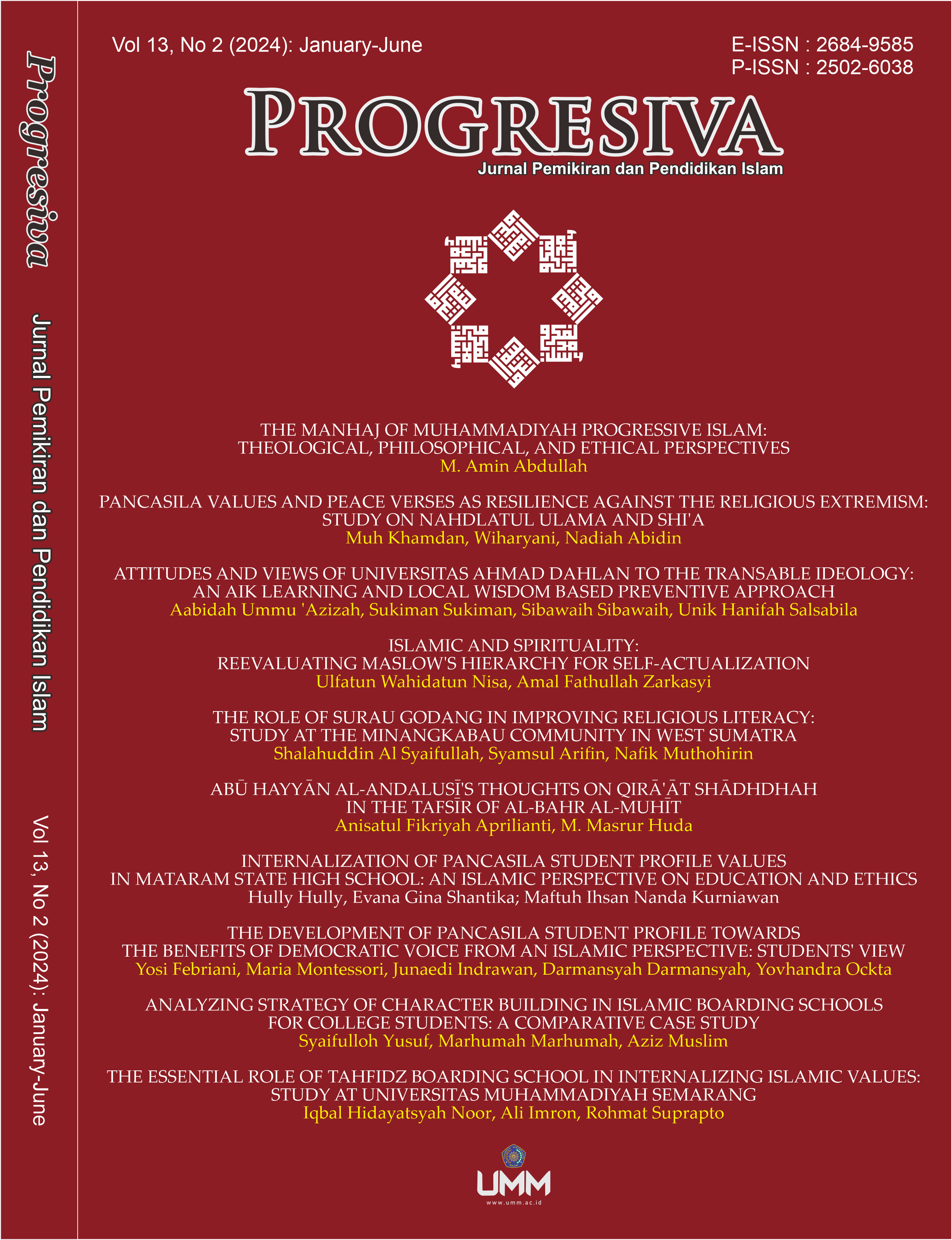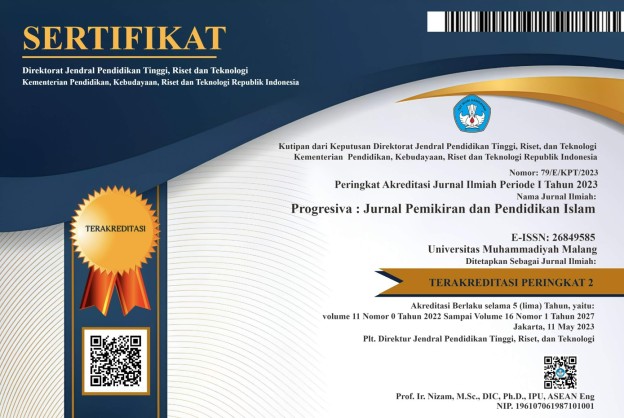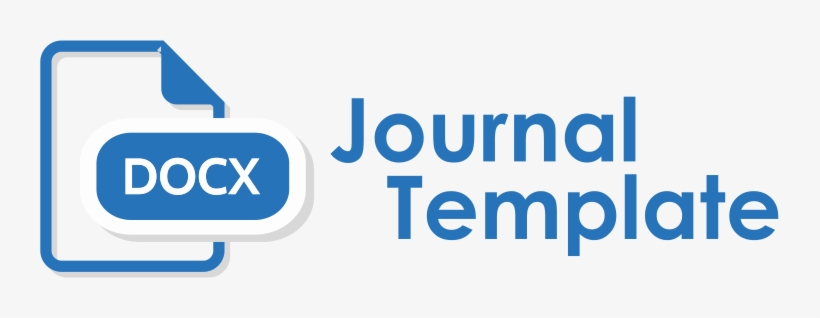The Development of Pancasila Student Profile towards the Benefits of Democratic Voice from an Islamic Perspective: Students' View
DOI:
https://doi.org/10.22219/progresiva.v13i02.33931Keywords:
Character, Democratic, Development, Islamic Perspective, PancasilaAbstract
This study aims to analyze the benefits of the democracy vote project in developing the Pancasila student profile, analyze the factors that affect the democracy vote project and describe students' perceptions of the democracy vote project at SMP Negeri 3 Gunung Talang, Solok Regency. The method used in this study is the Mix Methode of Sequential Exploratory design. The research was conducted on 15 informants and 55 respondents. Data were obtained by interviews, observations, documentation studies and filling out questionnaires. The results of the study show that the democratic voice project contributes to developing a profile of critical reasoning, cooperation and global diversity in students, while the factors that support the implementation of the democratic voice project include school readiness, student enthusiasm and enthusiasm, teacher competence and collaboration between teachers. Meanwhile, the factors that hinder the democratic vote project include a lack of support from students' parents, different teacher abilities and time management facilities and there are still some students who do not focus on participating in the democratic vote project activities. Furthermore, regarding the students' perception of the democratic vote project, it is good. This can be seen from the average percentage of student knowledge indicators about the democracy vote project, which is obtained on average 75.95% which is categorized as good. The indicator of student understanding of the content of the democracy vote project was obtained 86.05% which was categorized as good and the indicator of student assessment of the implementation of the democracy vote project was obtained 81.60% which was categorized as good. The overall achievement level of student perception was obtained with an overall average of 81.20%. So it can be concluded that the students' perception of the democratic vote project at Junior High School of 3 Gunung Talang is good. The implication of this research is that the implementation of the democratic voice project needs to be better organized and managed, and teachers need to improve their abilities through trainings to be more optimal in achieving the target of developing the Pancasila student profile. Students are expected to concentrate more on participating in project learning activities. As well as the need for support from parents and school committees to support the implementation of the vote project demorkasi democracy in schools.
Downloads
References
Abdennadher, S., & Cheffi, W. (2020). The effectiveness of e-corporate governance: an exploratory study of internet voting at shareholders’ annual meetings in France. Corporate Governance (Bingley), 20(4), 673–702. https://doi.org/10.1108/CG-04-2019-0116
Andari, I. A. M. Y., & Wiguna, I. B. A. A. (2023). Implementasi Kurikulum Merdeka Belajar Dalam Menstimulasi Kecerdasan Musikal Anak Usia Dini. Widya Sundaram : Jurnal Pendidikan Seni Dan Budaya, 1(1), 55–70. https://doi.org/10.53977/jws.v1i1.1019
Andolina, M. W., & Conklin, H. G. (2021). Cultivating empathic listening in democratic education. Theory and Research in Social Education, 49(3), 390–417. https://doi.org/10.1080/00933104.2021.1893240
Arisanti, D. A. K. (2022). Analisis Kurikulum Merdeka Dan Platform Merdeka Belajar Untuk Mewujudkan Pendidikan Yang Berkualitas. Jurnal Penjaminan Mutu, 8(02), 243–250. https://doi.org/10.25078/jpm.v8i02.1386
Brough, C. J. (2012). Implementing the democratic principles and practices of student-centred curriculum integration in primary schools. Curriculum Journal, 23(3), 345–369. https://doi.org/10.1080/09585176.2012.703498
Cahyati, L., & Dewi, S. F. (2023). Development of Digital Module Based on Flipbook Project to Strengthen Pancasila Student Profile to Improve Democratic Attitude. Proceeding of International …, 87, 119–130. https://doi.org/10.37640/ice.02.795
Firdaus, H., Laensadi, A. M., Matvayodha, G., Siagian, F. N., & Hasanah, I. A. (2022). Analisis Evaluasi Program Kurikulum 2013 dan Kurikulum Merdeka. Jurnal Pendidikan Dan Konseling, 4(4), 686–692. https://core.ac.uk/download/pdf/322599509.pdf
Fitriyani, F., Sunaryati, T., & Surya, V. M. K. (2023). Implementation Of Project-Based Learning Oriented To The Merdeka Learning Curriculum In The Form Of A Pancasila Student Profile With Global Diversity. Buana Pendidikan Jurnal Fakultas Keguruan Dan Ilmu Pendidikan, 19(1), 115–124. https://doi.org/10.36456/bp.vol19.no1.a6832
Harahap, I. A. P. (2023). Pancasila Student Profile as an Effort to Realize Student Character in Seeing Global Opportunities and Challenges. International Journal of Student Education, 1(2), 7–11.
Höhne, B. (2023). How Democracy Works within a Populist Party: Candidate Selection in the Alternative for Germany. Government and Opposition, 58(3), 478–496. https://doi.org/10.1017/gov.2021.33
Irchamni, A. (2022). Implementasi Kurikulum Merdeka Melalui Kegiatan Pembelajaran Menggunakan Metode STEAM Dan Media Berbahan Loose Parts Di Lembaga Paud. Jurnal Ilmiah Pedagogy, 21(1), 1–12.
Istianah, A., Maftuh, B., & Malihah, E. (2023). Konsep Sekolah Damai: Harmonisasi Profil Pelajar Pancasila Dalam Implementasi Kurikulum Merdeka Belajar. Jurnal Education and Development, 11(3), 333–342. https://doi.org/10.37081/ed.v11i3.5048
Kahne, J., Bowyer, B., Marshall, J., & Hodgin, E. (2022). Is Responsiveness to Student Voice Related to Academic Outcomes? Strengthening the Rationale for Student Voice in School Reform. American Journal of Education, 128(3), 389–415. https://doi.org/10.1086/719121
Kartika dkk. (2023). Implementasi Kurikulum Merdeka Pada Satuan Pendidikan Anak Usia Dini: Kumaracitta Jurnal Pendidikan Anak Usia Dini. Kumaracitta : Jurnal Pendidikan Anak Usia Dini, 01(01), 27–37. https://ejournal.windari.com/index.php/kum
Kemdikbud. (2022). Buku Saku Kurikulum Merdeka; Tanya Jawab. Kementerian Pendidikan Dan Kebudayaan, 1–50.
Kemendikbudristek. (2022). Dimensi, Elemen, dan Subelemen Profil Pelajar Pancasila pada Kurikulum Merdeka. Kemendikbudristek, 1–37.
Manalu, J. (2022). Program Pendidikan Guru Penggerak : Pijakan Kurikulum Merdeka Sebagai Implementasi Merdeka Belajar Driving Teacher Education Program : the Foundation of Freedom. Pendar: Jurnal Pengajaran Dan Riset, 02(01), 34–43. http://103.138.15.157/index.php/pendar/article/view/20%0Ahttp://103.138.15.157/index.php/pendar/article/download/20/16
Minsih, M., Fuadi, D., & Rohmah, N. D. (2023). Character Education Through an Independent Curriculum. AL-ISHLAH: Jurnal Pendidikan, 15(1), 597–602. https://doi.org/10.35445/alishlah.v15i1.2812
Noviani, H. D., Yanuarti, E., Habibah, S. M., Setyowati, R. R. N., & Fatmawati, F. (2022). Internalisasi Nilai-Nilai Moderasi Beragama Dalam Kurikulum Merdeka Belajar Pendidikan Agama Islam. Symfonia: Jurnal Pendidikan Agama Islam, 3(1), 126–135.
Purnawanto, A. T. (2022). Perencanaan Pembelajaran Bermakna dan Asesmen Kurikulum Merdeka. Jurnal Pedagogy, 20(1), 75–94.
Rani, P. R., Asbari, M., Ananta, V., & Alim, I. (2023). Kurikulum Merdeka : Transformasi Pembelajaran yang Relevan, Sederhana, dan Fleksibel. Journal of Information System and Management, 02(06), 78–84.
Satria, R., Adiprima, P., Wulan, K. S., & Harjatanaya, T. Y. (2022). Projek Penguatan Profil Pelajar Pancasila. Badan Standar, Kurikulum, Dan Asesmen Pendidikan, 137.
Sudirman, S., Jatmikowati, T. E., & Kusumaningtias, N. (2023). Penerapan Kurikulum Merdeka pada Pendidikan Anak Usia Dini di Kabupaten Jember. Jurnal Pendidikan Anak Usia Dini, 1(1), 1–10. https://doi.org/10.47134/paud.v1i1.32
Sugiyono. (2014). Metode Penelitian Pendidikan Kuantitatif, Kualitatif, dan R & D. Alfabeta.
Umar, Ockta, Y., & Mardesia, P. (2023). A Correlational Study: Pedagogical and professional competence of physical education teachers in relation to the implementation of the Merdeka curriculum. Journal of Physical Education and Sport, 23(12), 3325–3331. https://doi.org/10.7752/jpes.2023.12380
Wicaksana, A., & Rachman, T. (2018). 済無No Title No Title No Title. Angewandte Chemie International Edition, 6(11), 951–952., 3(1), 10–27. https://medium.com/@arifwicaksanaa/pengertian-use-case-a7e576e1b6bf
Downloads
Published
How to Cite
Issue
Section
License
Copyright (c) 2024 Yosi Febriani, Maria Montessori, Junaedi Indrawan, Darmansyah Darmansyah, Yovhandra Ockta

This work is licensed under a Creative Commons Attribution-ShareAlike 4.0 International License.


















